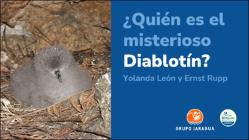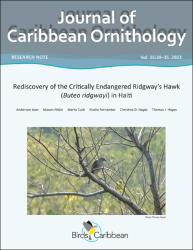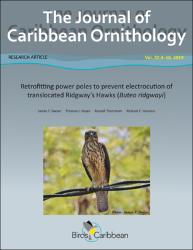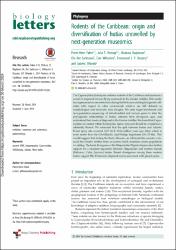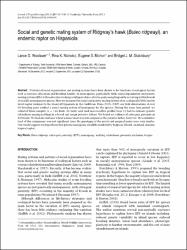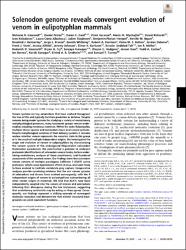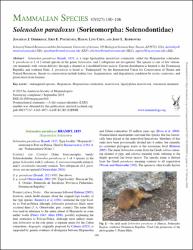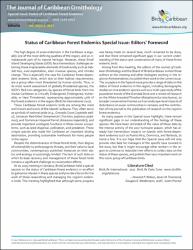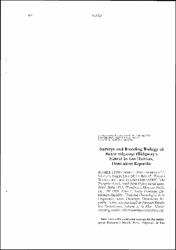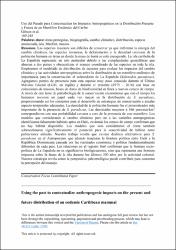Browsing Investigación ambiental by Subject "Especies amenazadas o en peligro de extinción"
Now showing items 41-52 of 52
-
¿Quién es el misterioso Diablotín?
(2022)El petrel de cabeza negra o Diablotín, ave endémica del Caribe, enfrenta muchas amenazas potenciales para su existencia continua, incluida la invasión humana, deforestación, modificación agrícola, exploración y el desarrollo ... -
Rediscovery of the critically endangered Ridgway’s Hawk (Buteo ridgwayi) in Haiti
(2023)[English] he Ridgway’s Hawk (Buteo ridgwayi) is a Critically Endangered, diurnal bird of prey endemic to the Caribbean island of Hispaniola and some satellite islands. This hawk was once distributed in lowland habitats ... -
Retrofitting power poles to prevent electrocution of translocated Ridgway’s Hawks (Buteo ridgwayi)
(2019)Abstract: A translocation program for Critically Endangered Ridgway’s Hawks (Buteo ridgwayi) in the Dominican Republic initially met with limited success because hawks were being electrocuted on power poles around the ... -
Rodents of the Caribbean : origin and diversification of hutias unravelled by next-generation museomics
(2014)The Capromyidae (hutias) are endemic rodents of the Caribbean and represent a model of dispersal for non-flying mammals in the Greater Antilles. This family has experienced severe extinctions during the Holocene and its ... -
Social and genetic mating system of Ridgway's hawk (Buteo ridgwayi), an endemic raptor on Hispaniola
(2013)Patterns of social organization and mating systems have been shown to be functions of ecological factors such as resource allocation and breeding density. In some species, particularly birds, social organization and genetic ... -
Solenodon genome reveals convergent evolution of venom in eulipotyphlan mammals
(2019)Venom systems are key adaptations that have evolved throughout the tree of life and typically facilitate predation or defense. Despite venoms being model systems for studying a variety of evolutionary and physiological ... -
Solenodon paradoxus (Soricomorpha: Solenodontidae)
(2015)Solenodon paradoxus, Brandt, 1833, is a large lipotyphlan insectivore commonly called the Hispaniolan solenodon. S. paradoxus is 1 of 2 extant species in the genus Solenodon, and 2 subspecies are recognized. The species ... -
Status of Caribbean forest endemics special issue : editors' foreword
(2017)The high degree of avian endemism in the Caribbean is arguably one of the most defining qualities of the region, and an irreplaceable part of its natural heritage. However, these Small Island Developing States (SIDS) face ... -
Surveys and breeding biology of Buteo ridgwayi (Ridgway's Hawk) in Los Haitises, Dominican Republic
(2005)We conducted surveys for the endangered Ridgway's Hawk, Buteo ridgwayi, in Los Haitises National Park, Dominican Republic, and in areas outside the park during the breeding seasons 2002 and 2003. In 2002, we recorded 47 ... -
The Red List of Magnoliaceae
(2007)This global evaluation of the conservation status of the Magnoliaceae has been one of the few attempts to evaluate an entire plant family. In total there are about 245 taxa described in the family and IUCN Red List categories ... -
The Red List of Magnoliaceae : revised and extended
(2016)The Red List of Magnoliaceae aims to stimulate conservation action for Magnolia species under threat. The Botanic Gardens Conservation International (BGCI) and the Global Trees campaign work with botanic gardens and other ... -
Using the past to contextualize anthropogenic impacts on the present and future distribution of an endemic Caribbean mammal
(2019)Island species are difficult to conserve because they face the synergy of climate change, invasive species, deforestation, and increasing human population densities in areas where land mass is shrinking. The Caribbean ...

